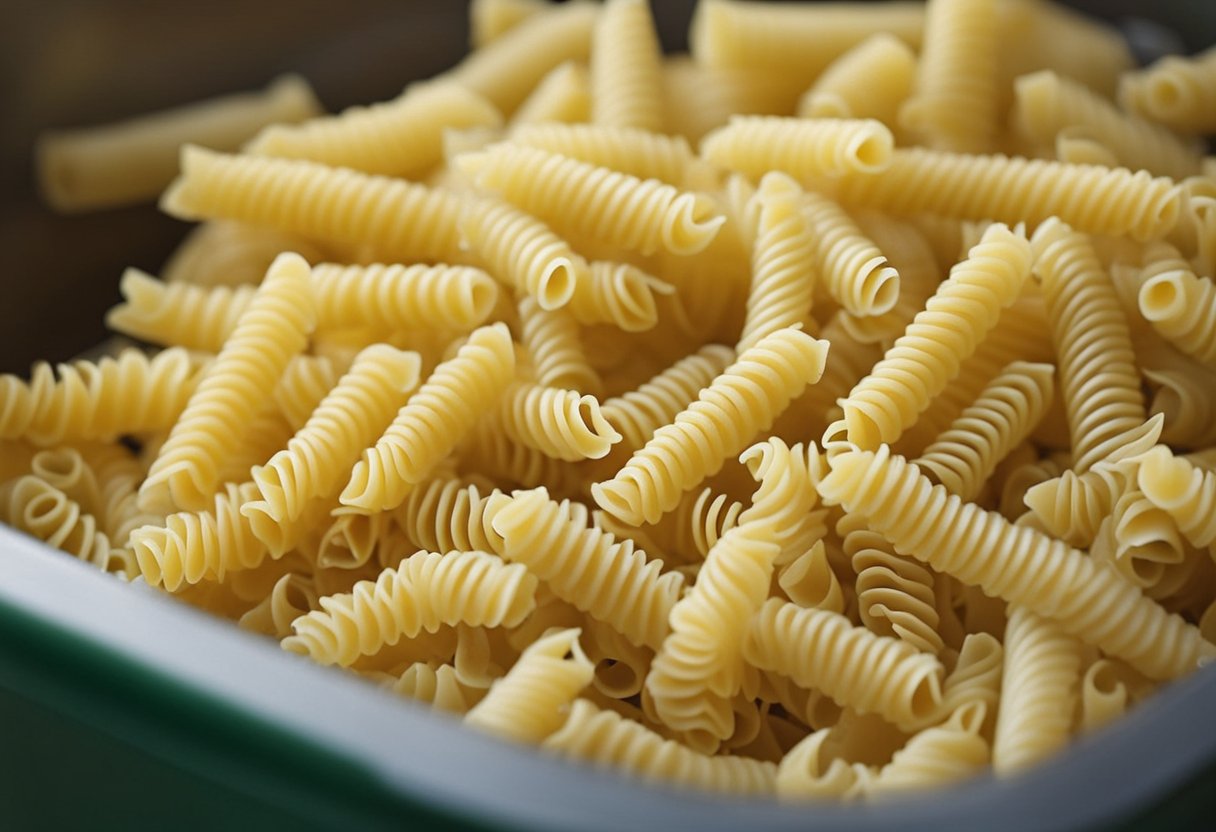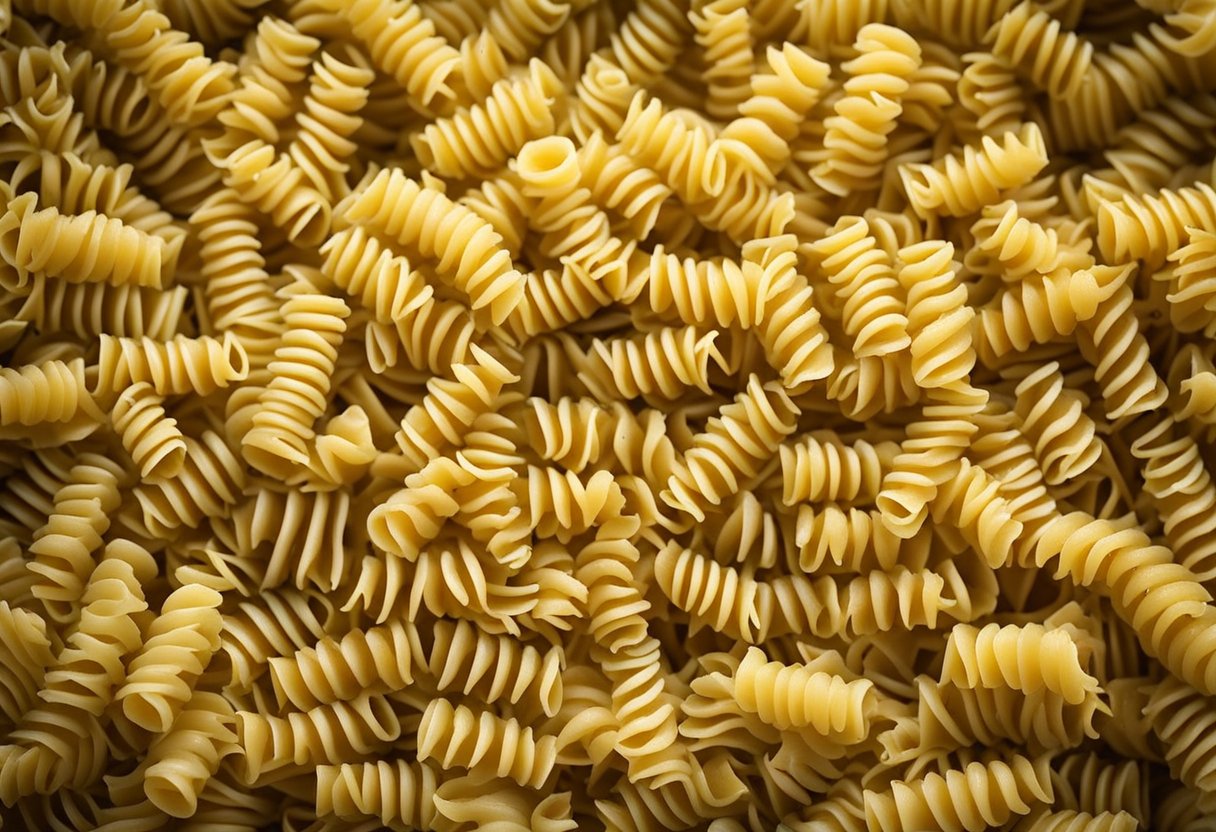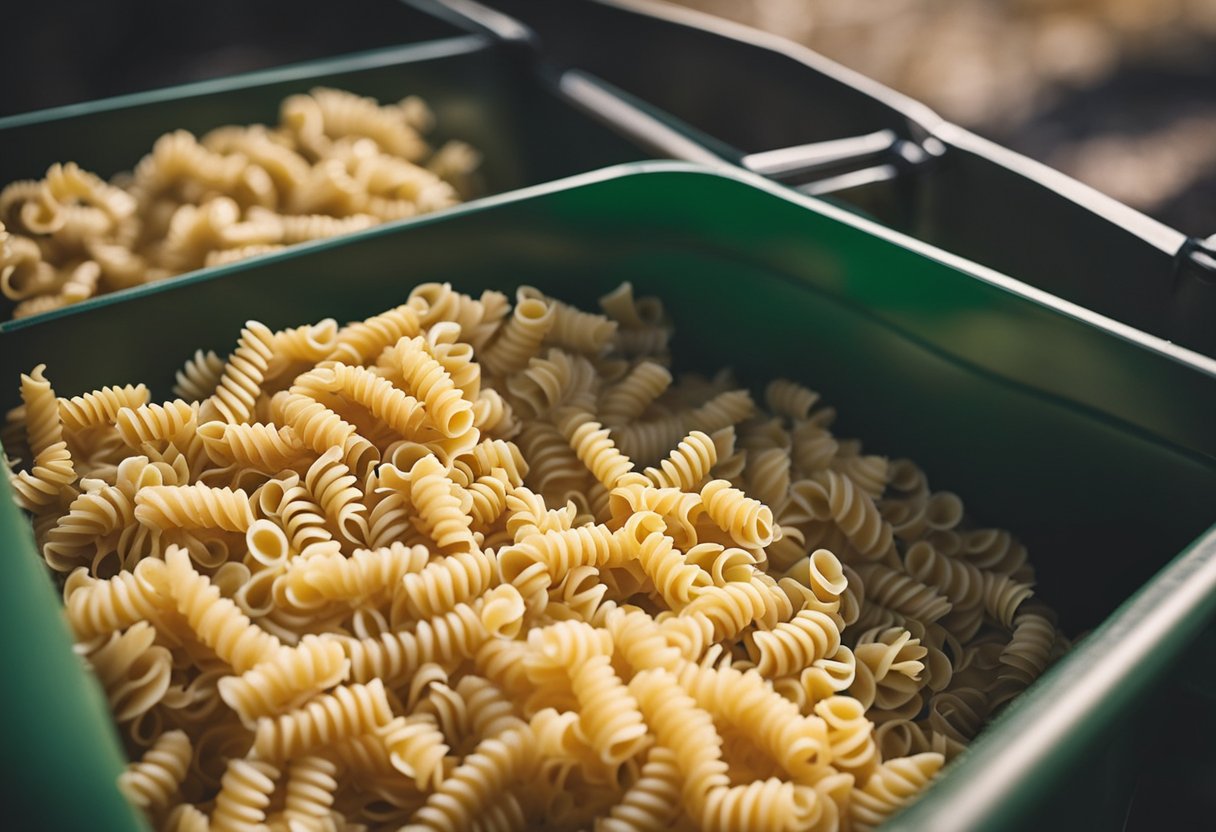As an Amazon Associate I earn from qualifying purchases.
At A Glance
Yes, you can compost uncooked pasta. Uncooked pasta is organic material and will decompose over time in a compost pile. It’s advisable to break the pasta into smaller pieces to help expedite the decomposition process. However, be aware that pasta may attract pests like rodents if not well-managed. Burying the pasta within the compost pile and ensuring a good mix of “green” materials like vegetable scraps and “brown” materials like leaves or twigs can help mitigate this issue and contribute to a balanced compost pile.
Composting is a great way to reduce waste and create nutrient-rich soil for your garden. But what about uncooked pasta? Can it be composted? The answer is yes, uncooked pasta can be composted.

When composting uncooked pasta, it’s important to remember to balance the carbon-to-nitrogen ratio. Pasta is high in carbohydrates, which means it’s a carbon-rich material. To balance it out, you’ll want to add nitrogen-rich materials like grass clippings or vegetable scraps. This will help create a healthy compost pile that will break down efficiently.
Another thing to keep in mind when composting uncooked pasta is to avoid adding too much at once. Like any other material, adding too much pasta to your compost pile can throw off the balance and slow down the decomposition process. It’s best to add pasta in small amounts, mixing it in with other materials to create a well-balanced compost pile.
Understanding Composting
Composting is the process of breaking down organic matter into a nutrient-rich soil amendment. This can be done in a compost bin or pile, and requires a balance of carbon-rich and nitrogen-rich materials, moisture, and oxygen. The end result is a dark, crumbly substance that can be used to improve soil health and plant growth.
The key to successful composting is maintaining the right balance of ingredients. Carbon-rich materials include things like dry leaves, straw, and wood chips, while nitrogen-rich materials include things like food scraps, grass clippings, and manure. It’s important to have a mix of both types of materials in your compost pile, as well as enough moisture to keep the microorganisms that break down the organic matter active.
Aeration is also important for composting. Turning the compost pile or using a composting bin with built-in aeration can help introduce oxygen to the mix, which helps the microorganisms do their job more efficiently. It’s also important to avoid adding materials that don’t break down easily, like meat or dairy products, as these can attract pests and slow down the composting process.
Overall, composting is a great way to reduce waste and create a valuable resource for your garden or yard. By understanding the basics of composting and maintaining the right balance of ingredients, you can create a nutrient-rich soil amendment that will benefit your plants and the environment.
What Can Be Composted
As an avid composter, I am often asked what can and cannot be composted. The good news is that there are many materials that can be composted, including uncooked pasta. In fact, composting pasta is a great way to reduce food waste and create nutrient-rich soil for your garden.
When it comes to composting, there are two types of materials: greens and browns. Greens are materials that are high in nitrogen, such as food scraps, vegetable scraps, and grass clippings. Browns are materials that are high in carbon, such as dried leaves, shredded cardboard, and sawdust. A good compost pile should have a balance of greens and browns.
Here are some common materials that can be composted:
- Leaves
- Sawdust
- Hay
- Grass clippings
- Coffee grounds
- Food scraps
- Straw
- Worms
- Dried leaves
- Browns (e.g. shredded cardboard)
- Bread
- Newspaper
- Rice
- Tomatoes
- Pine needles
- Yard waste
- Vegetable scraps
- Kitchen scraps
- Manures
- Wood ash
- Flowers
- Seaweed
- Tea bags
- Wood shavings
It’s important to note that not all materials are created equal. For example, meat and dairy products should not be composted, as they can attract pests and rodents. Additionally, while cooked pasta can be composted, it may take longer to break down than uncooked pasta.
Overall, if you’re unsure whether a material can be composted, it’s best to err on the side of caution and leave it out of your compost pile.
Composting Pasta

As an avid composter, I often get asked if pasta can be composted. The short answer is yes, both cooked and uncooked pasta can be composted. However, there are a few things to keep in mind when composting pasta.
Firstly, uncooked pasta is better for composting than cooked pasta because cooked pasta can attract wild animals looking for a hearty meal. In addition, uncooked raw and dry pasta is less likely to attract rodents, insects, and other pests that invade your compost bin.
When composting pasta, it is important to break it up into small pieces to help it decompose more quickly. You can also mix it with other organic materials like leaves, grass clippings, and vegetable scraps to create a balanced compost pile.
If you have leftover pasta with sauce, it is still safe to compost. However, it is recommended to scrape off as much sauce as possible before adding it to your compost bin. This is because certain sauces like oil-based ones can slow down the composting process.
In conclusion, composting pasta is a great way to reduce food waste and create nutrient-rich soil for your garden. Just remember to compost uncooked pasta, break it up into small pieces, and mix it with other organic materials for best results.
Balancing the Compost

When it comes to composting uncooked pasta, it’s important to maintain a proper balance of carbon-rich materials and greens. This balance ensures that there is enough nitrogen to break down the carbon-rich materials and enough carbon to absorb excess moisture in the compost pile.
Uncooked pasta is considered a starchy food, which means it’s a good source of carbon for the compost pile. However, it’s important to balance the carbon-rich materials with brown materials to prevent the compost from becoming too wet and slimy. Brown materials, such as dried leaves, straw, and shredded paper, are high in carbon and help to absorb excess moisture in the compost pile.
In addition to balancing the carbon-rich materials and brown materials, it’s important to mix the compost pile regularly to ensure that the materials are evenly distributed. Mixing the compost pile also helps to aerate the pile, which promotes the growth of beneficial microorganisms that break down the organic matter.
Overall, composting uncooked pasta is a great way to reduce waste and create a nutrient-rich fertilizer for your garden. By balancing the carbon-rich materials with brown materials and mixing the compost pile regularly, you can create a healthy and productive compost pile.
Potential Issues with Composting Pasta
When composting uncooked pasta, there are a few potential issues to keep in mind. One of the main concerns is attracting pests, such as rodents and other critters. These pests are attracted to the starchy carbohydrates in pasta, which can lead to an infestation in your compost pile.
Another potential issue is the decomposition process of pasta. Pasta can take longer to break down than other compostable items, which can lead to a buildup of moisture in your compost pile. This moisture can create an unpleasant odor and promote bacterial overgrowth, which can slow down the composting process.
Additionally, if your pasta contains salt, tomato sauce, or other table scraps like meat or oily sauces, it can be harmful to your compost pile. These items can slow down the decomposition process and lead to bacterial overgrowth, which can create an unpleasant odor.
To avoid these potential issues, it’s important to balance the amount of pasta you add to your compost pile. You should also make sure to layer the pasta properly and mix it in with other compostable items to promote even decomposition. If you’re unsure about whether or not to add certain items to your compost pile, it’s always best to err on the side of caution and leave them out.
Preventing Pests
As with any composting process, it is important to prevent pests from infesting the pile. Pasta, whether cooked or uncooked, can attract rodents, birds, and other pests if not properly managed.
To prevent pests, it is recommended to bury the pasta deep in the middle of the compost pile and cover it with carbon-rich materials such as leaves or straw. This will help to mask the smell and make it less accessible to pests.
It is also important to avoid adding too much pasta to the compost pile, especially if the pasta scraps are from cooked pasta. Cooked pasta can be more attractive to pests due to its higher moisture content.
Additionally, it is important to maintain a proper balance of moisture in the compost pile. Too much moisture can lead to bacterial overgrowth, while too little moisture can slow down the composting process.
By taking these steps, you can help to prevent pests from infesting your compost pile and ensure that your uncooked pasta composts effectively.
Environmental Impact of Composting
Composting is a great way to reduce the amount of waste that ends up in landfills. By composting uncooked pasta, we can reduce the amount of methane gas that is released into the atmosphere. Methane is a potent greenhouse gas that is generated when organic waste decomposes in landfills. By composting, we can reduce the amount of organic waste that ends up in landfills, which in turn reduces the amount of methane gas that is released into the atmosphere.
Composting also helps to reduce the amount of energy that is required to recycle waste. Recycling requires a lot of energy, and by composting uncooked pasta, we can reduce the amount of energy that is required to recycle other types of waste. Additionally, composting can help to reduce the amount of water that is required to grow plants. Compost is rich in nutrients and can help to improve soil quality, which in turn can reduce the amount of water that is required to grow plants.
Overall, composting uncooked pasta is a great way to reduce our environmental impact. By composting, we can reduce the amount of waste that ends up in landfills, reduce the amount of methane gas that is released into the atmosphere, reduce the amount of energy that is required to recycle waste, and reduce the amount of water that is required to grow plants.
Other Composting Materials
In addition to uncooked pasta, there are several other materials that can be composted. Meat and fish scraps, for example, can be added to your compost pile. However, it is important to note that meat and fish can attract pests and emit strong odors, so it is best to bury them deep within the pile and cover them with other materials.
Newspapers are another compostable material. However, it is important to ensure that the ink used on the newspaper is soy-based and not petroleum-based. If it is petroleum-based, it can release harmful chemicals into the soil and harm the plants that grow in it.
Shredded tree branches can also be added to your compost pile. However, it is important to ensure that the branches are small enough to decompose easily. If the branches are too large, they may take a long time to break down and may not decompose fully.
Yard trimmings, such as leaves and grass clippings, are also great additions to your compost pile. These materials are high in nitrogen and will help to speed up the decomposition process. However, it is important to ensure that you do not add too many yard trimmings to your pile, as this can cause the pile to become too wet and slimy.
Overall, there are many materials that can be composted, including uncooked pasta, meat and fish scraps, newspapers, shredded tree branches, and yard trimmings. By composting these materials, you can help to reduce waste and create nutrient-rich soil for your plants to grow in.
